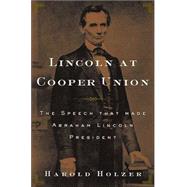
Introduction
Chapter One: "Abe Lincoln Must Come"
Chapter Two: "So Much Labor as This"
Chapter Three: "Some Confusion in the Arrangements"
Chapter Four: "Much the Best Portrait"
Chapter Five: "Nothing Impressive About Him"
Chapter Six: "The Strength of Absolute Simplicity"
Chapter Seven: "Such an Impression"
Chapter Eight: "Unable to Escape This Toil"
Chapter Nine: "Preserve It for Your Children"
Epilogue
Appendix: Abraham Lincoln's Cooper Union Address
Notes
Acknowledgments
Index
The New copy of this book will include any supplemental materials advertised. Please check the title of the book to determine if it should include any access cards, study guides, lab manuals, CDs, etc.
The Used, Rental and eBook copies of this book are not guaranteed to include any supplemental materials. Typically, only the book itself is included. This is true even if the title states it includes any access cards, study guides, lab manuals, CDs, etc.